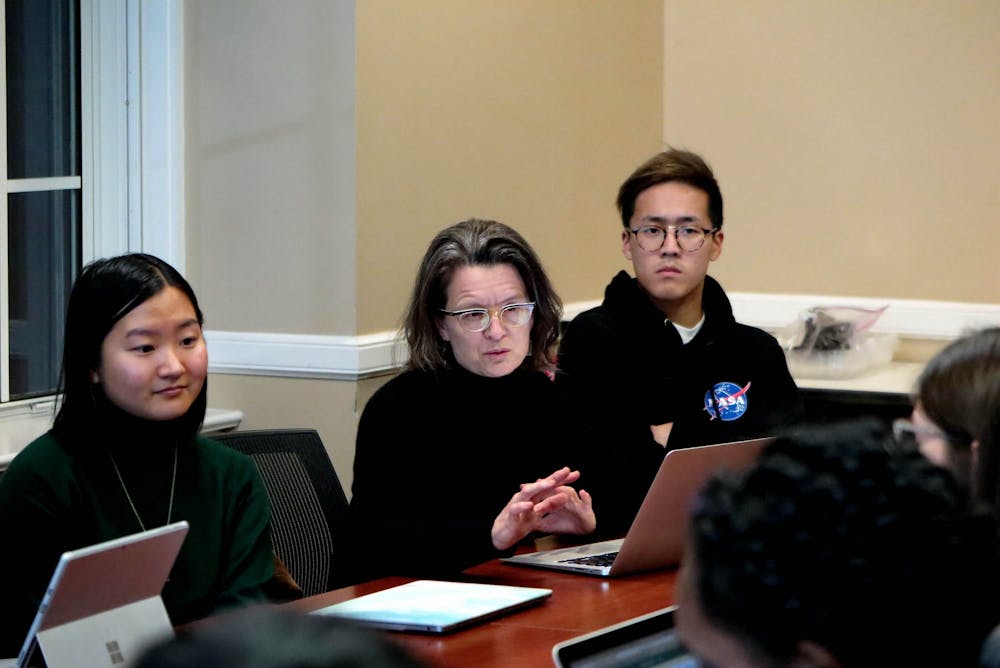Throughout the summer and as Duke reopens, one question is constantly on the mind of faculty with kids: What does child care look like during the COVID-19 pandemic?
Faculty have taken a variety of approaches to managing their professional and personal obligations, but for many, working from home without child care has meant decreased productivity—and anxiety about the long-term implications of that productivity dip.
Catherine Mathers, associate professor of the practice of international comparative studies, is mother to two eight-year-old twin girls. Her family decided to split child-care and homeschooling duties with a family that lived next door.
“We were basically all together that weekend where everything started to get shut down and schools were shut down, and so we basically quarantined together,” Mathers said. “We had four kids in ‘school’ for six hours a day.”
Mathers said she and her husband, also in academia, are lucky that their jobs allow for doing work “in [their] own time” and taking care of the kids, but she recognizes that this is far from the reality for everyone.
“I'm speaking from a position and a faculty position that is, I think, very privileged in the context of the University and then of course even more privileged in the context of labor and work outside the University, outside academia,” she said.
Mathers emphasized a few key areas in which the University could provide support to faculty with kids at home, one being a message of support to untenured faculty and the other being providing space and resources to do work outside the home.
“Some academics, maybe they have houses with their own study and whatever, and they can close the door. We don't have that sort of space,” she said, “I don't have a printer. I can’t scan. And of course, getting materials to students. I can't do that.”
Assistant Professor of History James Chappel shared similar sentiments. Chappel, the father of two young kids, felt—as did Mathers—that the six-month tenure clock extension Duke put in place due to the pandemic was an important message of support to untenured faculty.
“That's like the biggest material thing I can imagine that they could do,” Chappel said. “And they did do that. To me, that showed a recognition, even though it doesn't make our lives easier on the day to day, it's a recognition that, ‘We know that this is going to be a black hole of work.’”
Chappel said that the balance between child care and work has been challenging, citing a 14-hour parenting day from 6 a.m. to 8 p.m., only after which he can start working.
“Am I really going to start working after that? I could and I have been, but I feel so completely drained at the end of the day,” he said. “I'm aware of the privilege, but on the day to day it's just really, really, really challenging.”
Yet Chappel said that he felt that support would come if he knew how to ask.
“I've had the feeling that Duke would help me if I could think of what I needed,” he said. “But Duke does not provide child care.”
Experts weigh in
Jocelyn Olcott—professor of history; international comparative studies; and gender, sexuality and feminist studies—is one of three team leaders for the Bass Connections team The Value of Love: Global Perspectives on the Economy of Care.
The team spent the school year working with researchers around the world to look at the potential for a “global care index,” a tool to rate countries on how they value all forms of care, from environmental care to health care.
Amanda Kang, a junior and a member of the project team, identified child care as her topic of interest, and she researched it throughout the spring semester.
When students were sent home because the pandemic, Kang decided to reach out to the gender, sexuality and feminist studies department to help with a podcast series they were starting related to the work of her Bass Connections team.
Kang helped put together the panel for the first episode, a group consisting of Rep. Katherine Clark (D-Mass.); Rhian Evans Allvin, CEO of the National Association for the Education of Young Children; and Bisa Batten Lewis, president of the Black Child Development Institute-Atlanta and managing partner of Ideal Early Learning.
Get The Chronicle straight to your inbox
Sign up for our weekly newsletter. Cancel at any time.
The panel spoke about the underfunding of child care and the disproportionate effect the pandemic has had on women, particularly women of color, who are the majority of the child-care labor force.
Kang told The Chronicle that the biggest takeaway from the discussion was just how prevalent the issue was before, though it really took “COVID to really crack down on [the problem].”
“How we reopen will be really different given that there's just such a lack of funding, and it's going to be really hard for providers to make the adjustments necessary to reopen,” she said.
Olcott agreed with panelists on the podcast.
“One of the things that I think has been interesting with COVID is… how it's made visible to many, many more people what a problem [child care] is,” she said. “The problem isn't that [parents] have to ‘do’ child care, the problem is people trying to do child care and do their full-time jobs at the same time.”
Olcott has been discussing potential solutions to the child-care problem with colleagues but has found it difficult to pin down answers.
“I do keep asking colleagues, ‘What would we like to see the administration do,’ and I'm coming up empty or coming up with some range of people just sort of throwing their hands and being very frustrated,” she said.
That said, a few ideas have been “floated,” Olcott said.
“You could set up something like a health savings account that'll be a child-care savings account, that would be tax deductible, that maybe employers contribute to. That would create the possibility of at least having some kind of child care, of payment for child care or subsidized child care going forward,” she said.
Olcott noted that this solution does not solve the problem of the availability of child care, nor does it make things easier for parents who can’t send their kids to school, but it does provide support for parents who may need to hire help “for two weeks because [their] kid has gotten quarantined,” for example.
Another possible solution, Olcott said, is an office that vets child-care providers, ensuring that these individuals are being regularly tested, wearing masks and taking appropriate health measures. These individuals would be on call to help employees with child care should the need arise.
“Or just simply giving faculty who are parents either leave now or the ability to take leave later to catch up,” Olcott said.
Ultimately, the future is unclear, which makes it difficult to come up with lasting solutions.
“There's not an easy solution for any of this other than just saying you're going to give people paid leave, but you can't do that forever,” Olcott said, “We're looking at something that can go on for a few years. That's a pretty hard call for administration to make. I mean, Duke is a very generous place, but even for Duke. Much less for places with fewer resources.”

Preetha Ramachandran is a Trinity senior and diversity, equity and inclusion coordinator for The Chronicle's 118th volume. She was previously senior editor for Volume 117.

